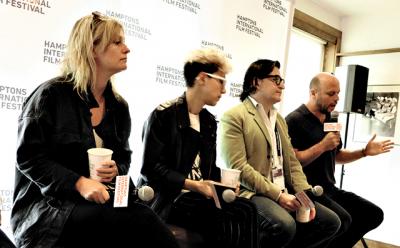Filmmakers Talk Character-Driven Docs

Four filmmakers whose works were in the Hamptons International Film Festival’s documentary competition gathered at Rowdy Hall in East Hampton on Saturday morning as part of the Winick Talks series. The directors are linked by their obsessions with specific individuals whose personalities and circumstances not only drove the filmmakers to make their films but also in large part determined how those films evolved.
“Pebbles at Your Door,” a short documentary by Vibeke Bryld, a Danish filmmaker, is the story of a North Korean woman who grew up believing her life in Pyongyang was charmed. Eventually, her world fell apart, and she ultimately escaped via China to the south, where she encountered a very different society from that portrayed by North Korea’s propaganda.
“I had to hide her identity since her family escaped to the south,” said Ms. Bryld. “You don’t see her, you only hear her voice.” The film is composed almost entirely of still images. The filmmaker and her set designer created sets based on their research into propaganda films from North Korea.
David Shapiro’s “Missing People” also has a mysterious woman at its center. Martina Batan is a New York gallery director who had purchased a work by Mr. Shapiro, who is also a visual artist. She invited him to her studio to look at the work of Roy Ferdinand, an outsider artist from New Orleans, whose paintings were “very violent, very sexual, very graphic,” according to the filmmaker.
“I thought, ‘Something is going on here that doesn’t add up.’ My intuition told me this artist was very compelling and she was obsessed with him, and I wondered why. I felt there was something rumbling under the surface, and she wasn’t going to tell me what it was.”
Mr. Shapiro learned a year and a half into the film that Martina’s brother had been murdered in New York City in the 1970s. So the film became a double narrative of Martina’s investigation into Roy Ferdinand and her private investigator’s investigation of her brother’s unsolved murder.
Mystery surrounded the subject of Ilinca Calugareanu’s “Chuck Norris vs. Communism.” During the 1980s in Romania, when the dictator Nicolae Ceausescu was still in power, a blackmarket VHS racketeer smuggled more than 3,000 foreign films into the country, many of them American blockbusters, which Irina Nistor, a translator, dubbed into Romanian. “She was huge in Romania,” said Ms. Calugareanu, “everyone knew her voice.”
“From the beginning I knew it was a great story. My concern was how to tell something that happened 25 years ago, especially since there was very little archival material from that period.” This dilemma led to staged re-enactments of the smuggling and dubbing process. “The man in the shadows who started this whole business didn’t want to be filmed, but he relented for the final image.”
An extraordinarily complex character was the impetus for Jon Fox’s film, “Newman.” “It’s a story of superlatives,” said the filmmaker. “There’s a backwoods maniac genius who comes up with a free energy motor than can end oil, operates on magnetism, and he gets a tremendous amount of support from the science community in the late 1970s.”
Mr. Fox first met Joseph Newman 12 years before becoming a filmmaker, and the story stayed with him. When the inventor was unable to get a patent, he sued the patent office, had 15 minutes on the Johnny Carson show, and even rented the Superdome for a demonstration, where “he ranted about this and that.”
Mr. Fox avoided showing his subject, except in archival footage, for the first 50 minutes of the film. Eventually, “I got to the point where I did something unconventional — I entered the story.” He tried to bring him inventors and academics to see if he could reignite some interest, but Mr. Newman’s “ways don’t work for him. I think the technology works, but he’s so difficult that in the end that eclipses the motor and my film.”
Later the discussion turned to the problems of getting a film out into the world. With the exception of Ms. Bryld, who cited the Danish Film Institute as a source of income for her — “We are quite spoiled,” she said — the general consensus was that, difficult as it is to support yourself in the field, drive, determination, and commitment to an idea more often than not will carry you to the finish line.
